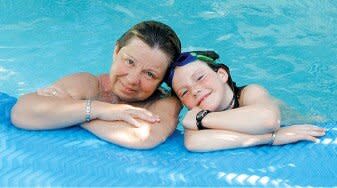Teach Your Kid This Skill—It Could Save His Life

I had the pleasure of attending USA Swimming's Golden Goggles Gala. (Think the ESPY's but for swimming.) Now you might think the night was all hot athletes and trophies—and you wouldn't be totally wrong. But what might surprise you is that there was a great emphasis on swimming not just as sport, but as a life-saving skill.
In 2007, the USA Swimming Foundation introduced the Make a Splash initiative in response to the approximate ten unintentional drownings per day that occur across America, according to the CDC. "There is an 88 percent chance that a child will be safer around the water than they would have been if they hadn't taken swimming lessons," says USA Swimming Foundation Executive Director Debbie Hesse.
So why have so many parents neglected swimming lessons for their children? Part of it is certainly funding, which is why the organization has put over 3 million children through swimming lessons and spent over $3.3 million in swimming scholarships to date. Make a Splash local partners such as the YMCA, Red Cross, and Swim America, provide additional funding to kids in their communities. These partners feature lessons with curriculum approved by Make a Splash.
Still a huge problem, aside from funding, is the fact that if a parent doesn't know how to swim, then there is only a 13 percent chance their child will learn to swim. That leaves 87 percent of children carrying on a life-threatening legacy. Currently, 70 percent of African American children, 60 percent of Hispanic Latino children, and over 40 percent of Caucasians children cannot swim.
Four-time Olympic gold medalist Missy Franklin is one of the 13 percent to swim, though her mother never learned. "She didn't grow up in the water, so she never had that sense of security around the pool," said Franklin. "She didn't want me to have that same fear." "Every day ten people drown and that was scary," says Franklin's mom D.A. "Just seeing her gravitate toward the water, I just knew we had to get her in lessons."
It's important for children to learn to swim, whether or not they plan to be an Olympian one day. It's tough to know exactly what makes an effective swimming program, so we asked some of the experts to weigh in on swimming lesson basics.
When to start
"There's no too young,"? says Golden Goggles Coach of the Year Bruce Gemmel.
Get your kid used to be around water starting at 6 weeks old, says Hesse.
Some babies can learn as early as age 1 in a Mommy and Me class.
Many people say about 2-3 years old is a great time to get your kid in formal swimming lessons.
You don't have to wait until the summer for lessons. There are many locations for winter indoor swim lessons so your kid will be ready for all those birthday pool parties come June.
What to look for
Find a local partner in your area by visiting usaswimmingfoundation.org. They feature Make a Splash-approved curricula.
If you go for a group setting, class size is important. "There should be no more than six kids in the water per instructor,"? says Hesse.
You also want to be sure that the teacher has been trained and is actively engaged and communicating well with his students. "They're not checking their phone or out of the water using the restroom and leaving the kids behind,"? says Gemmel.
It's definitely a great idea to stop in and watch the program and be sure you feel comfortable asking questions of the instructors and administrators.
Extra benefits
Swimming is a great way to build community and make friends. "I've made basically all of my best friends through swimming,"? says Franklin.
Your child can build up his confidence.
Swimming can also be a lifelong sport
Because it is low-impact, swimming is healthy for growing bodies.
While Make a Splash focuses on kids learning to swim and having fun in the water, taking it to the competitive level—even locally—is always an option. Attending early morning practices and meets can buff up his work ethic, his time management skills, and his self-discipline—while also maybe buffing up his arms.
From swimming lessons to arts and crafts, find activities that are great for you and your kids!
Ruthie Fierberg is an editorial assistant at Parents. Though she does not have children of her own, she's practically been raising kids since her first babysitting job at age 11. She is our resident theater aficionado and can be found constantly running around New York City to find the best new show, the most awesome dance party, or the hottest Bikram yoga studio. Follow her on on Twitter @RuthiesATrain.
Photograph: Missy Franklin at age 7 with her mom, D.A. / Courtesy USA Swimming & the Franklin family